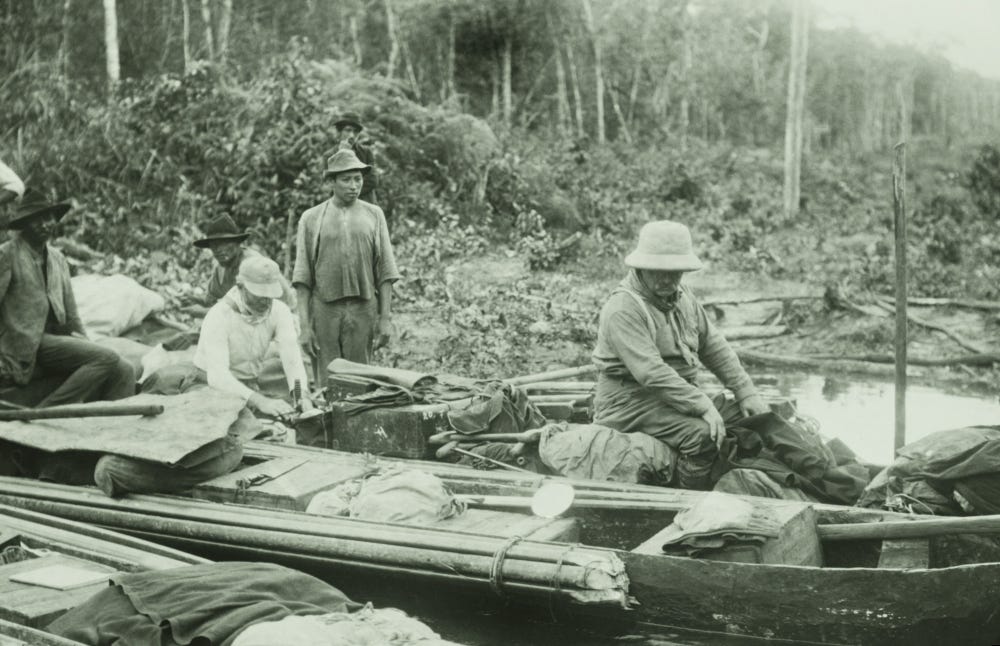During my weeks away from the office in these dog days of summer, I am fortunate enough to have the time to sit down and enjoy a good book. Last year, after far too many summers away from this pastime, I finally dived into the world of reading, and this summer I have kept up the habit. However, my reading has one strict parameter: the book must be historical nonfiction. My choice was The River of Doubt: Theodore Roosevelt’s Darkest Journey by Candace Millard, who happened to be the author of another book I reviewed about the grim demise of President James Garfield. And like the chronicles of Garfield’s final days, Millard’s account of Roosevelt’s ill-advised expedition to the Amazon was a harrowing account of an American president encountering severe adversity. Only this time, the president in question was lucky enough to survive.
Just barely.
Following his quixotic and ultimately failed quest for a third presidential term (legally possible until 1951) in 1912 with his newly-founded Bull Moose Party, Theodore Roosevelt was a man looking for redemption. After a lifetime of hardships and setbacks followed by heroic deeds that solidified his reputation as a larger-than-life figure, Roosevelt responded to this latest setback the only way he knew how: another daring quest of discovery. Because of this background, Roosevelt believed himself to be entirely invincible, a man who could overcome any challenge and emerge even stronger. The challenge he accepted was a cartographic expedition down an unknown and unexplored river in South America named by legendary Brazilian explorer and master of the Amazon Colonel Candido Rondon. The river was ominously and mysteriously named the Rio da Duvida in Portuguese, and in English the River of Doubt. What Roosevelt did not know in 1913 was that this river was prepared to exact a heavy price even on the most experienced explorers.
In February 1914, Roosevelt, Rondon, Roosevelt’s son Kermit, and 16 other men began their canoed journey down the river. While initially the expedition rolled along smoothly thanks to the river’s placid flow, things took a dramatic turn when the waters turned from peaceful to tempestuous. The men were thus forced to endure grueling hikes carrying heavy canoes and other supplies while hacking their machetes through the impassable jungle. Whenever they did attempt to brave the rapids, the expedition would often see canoes and vital supplies shattered on the river’s rocks and whirlpools, of which one of the latter swallowed a Brazilian porter and almost swallowed Kermit Roosevelt. Beyond mere rapids, the expedition also had to fear attacks by Piranhas, or worse, a Candiru. Opening that prior link is a step I would only recommend for the bold, and even then, I must warn of nightmares for several days.
While fortunately no member of the Roosevelt-Rondon expedition was struck by this most hideous fish, they certainly encountered other severe challenges I certainly could never cope with. These challenges included starvation rations of food that cost Roosevelt more than 50 pounds of body weight, mosquito bites and the constant risk of malaria infection, hostile natives who had never encountered such strange outsiders, and many more. However, it was the malaria that proved itself to be the greatest danger for Roosevelt, almost ending his life. Thus, when Theodore Roosevelt finally returned to his home in New York, his declining health put an end to his daring expeditions and feats of physical endurance— permanently. Of course, I won’t give away too much of Roosevelt’s most harrowing moments in the jungle lest you have no incentive to open Millard’s book.
I simply cannot allow that.
While I encountered a similar experience with Millard’s James Garfield chronicles of exacting details I ended up glossing over in order to comprehend the bigger picture, the overall vibe of The River of Doubt reminded me of what I have heard of Joseph Conrad’s classic novella (which I have not read) Heart of Darkness, detailing ever-darker savagery as the story descends deeper into the Congolese jungle. While outright savagery was not a feature of the Roosevelt-Rondon expedition, the atmosphere of foreboding as they venture further from civilization was my favorite aspect of the book.
In conclusion, if you love history, and admire the truly badass nature of President Theodore Roosevelt, I will most certainly recommend Candace Millard’s The River of Doubt: Theodore Roosevelt’s Darkest Journey, but only if you dare learn the true horrors of the Candiru.




